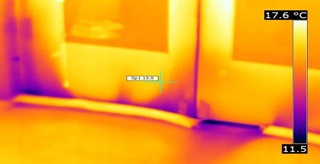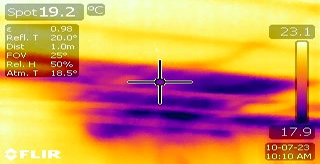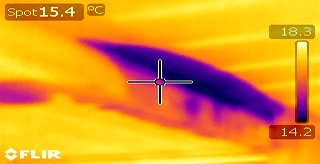Energy loss
Insulation inspections
Why do I need a Thermal Imaging Inspection?
An thermal or infrared inspection can reveal many hidden issues in a building that would not be visible to the naked eye. The use of thermal imaging makes it possible to detect water leaks behind plaster ceilings, in bathrooms, in roofs, concrete slabs or interior walls without the need for destruction.
The inspection can be used to detect the following:
Using the latest thermal imaging technology we can discover the location of leaks previously only found by removing tiles or demolishing walls or lifting the floor substrata.
We use infrared imaging as part of our investigation in the detection of leaks or seepage, which cause damage to buildings, walls, floor and timber.
We have level 1 & 11 certified infrared thermographer so you can be assured his skills and training are the best available.
Our professional and quality services will provide you with the information you need to make educated decisions about the condition of the property. Whether you are concerned about leaks, smells or quality assurance. Independent Plumbing Inspections can help you.
How does Thermal Imaging work?
Thermal cameras measure radiated heat and convert this energy into a visual picture of the area behind the walls or under the floor. In recent years Thermal Imaging technology has become one of the most valuable diagnostic tools for all types of leak detection.
Thermal imaging cameras use the latest infrared technology to measure changes in surface temperature that cannot be seen the naked eye, which makes it the ideal tool for tracking down those hard to find water leaks.
It’s simple, non-intrusive way to locate leaks before they become a real problem.
How does thermal imaging find the exact location of the leak?
This method allows the technician to trace the cause of the leak back to its origin by following the changes in radiated energy.
How can images be seen clearly if it just photographs energy?
Mini computers in our camera convert the intensity of radiation into what is called pseudo-colour enabling us to see the greater intensity of radiation in a colour format like a photograph. Our thermal imaging cameras work like a normal camera but they do not depend on light. They can work in total darkness because they photograph the radiation.
There are many other situations where thermal imaging can be put to great use. It is highly recommended that any new home buyer have the entire home scanned before committing to purchasing the home. As well as any plumbing leaks or roof leaks we can also pick up on things like missing insulation in ceilings or walls, water leaks in concrete slabs, in slab heating systems problems, air leaks around poorly fitted windows and doors plus many other uses.
Advantages of Thermal Imaging Inspections
Call All Points Safety For a Free no obligation Quote



